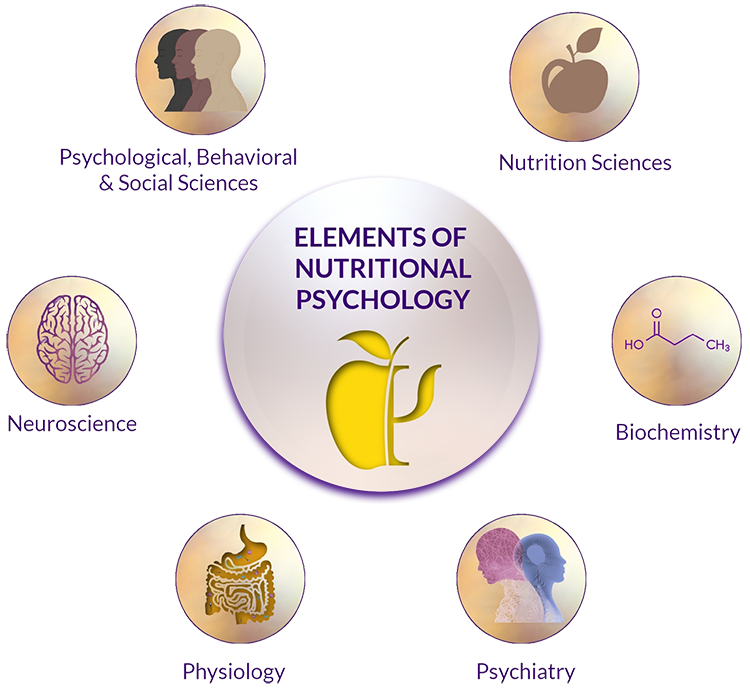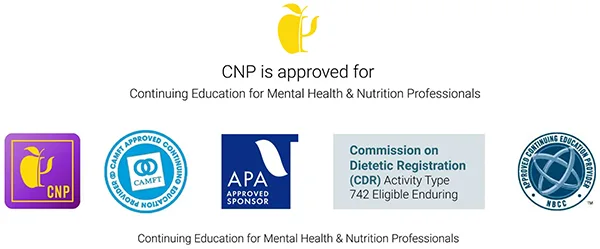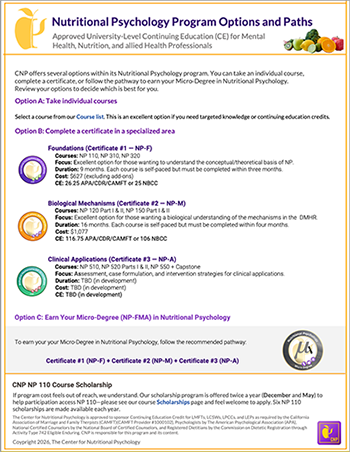 Bridging Two Professions
Bridging Two Professions
 Global recognition of the impact of nutrition and dietary intake on mental health continues to increase. While mental health professionals are well trained in behavior change, diagnostic assessment, and therapeutic intervention, they receive little formal education on how nutrition affects mood, cognition, and behavior or how nutritional factors intersect with their areas of expertise. Similarly, nutrition professionals are well-versed in dietary assessment, nutritional counseling, and metabolic health, but their training seldom includes a formalized understanding of how psychological, cognitive, and behavioral factors shape their clients’ dietary patterns.
Global recognition of the impact of nutrition and dietary intake on mental health continues to increase. While mental health professionals are well trained in behavior change, diagnostic assessment, and therapeutic intervention, they receive little formal education on how nutrition affects mood, cognition, and behavior or how nutritional factors intersect with their areas of expertise. Similarly, nutrition professionals are well-versed in dietary assessment, nutritional counseling, and metabolic health, but their training seldom includes a formalized understanding of how psychological, cognitive, and behavioral factors shape their clients’ dietary patterns.
Nutritional Psychology is an emerging field that bridges this divide, integrating knowledge from psychology, nutrition science, neuroscience, physiology, biochemistry, psychiatry, and the behavioral and social sciences to advance both education, clinical practice, and research at the intersection of diet and mental health (Benschopp et al., 2025).
By bringing these disciplines together, Nutritional Psychology fosters the development of a shared interdisciplinary language and new conceptual frameworks that expand the boundaries of psychological science.
At the core of Nutritional Psychology is the diet/nutrition–mental health relationship (DMHR), which examines how nutrition and dietary patterns interact with all aspects of our psychological well-being and mental health, including our thoughts, emotions, behaviors, and perceptions.

The DMHR provides a foundational framework for articulating and studying the complex connections between dietary patterns and psychological functioning across research and clinical practice. Through its multidisciplinary approach, Nutritional Psychology seeks to deepen the understanding of how nutrition contributes to mental health and well-being, as well as how each scientific discipline enriches this growing field.

How Do I Begin My Training in NP?
Professionals typically enter the field of nutritional psychology with a background in psychology, counseling, nutrition, or health sciences. A four-year bachelor’s degree is usually the starting point, with majors such as psychology or nutrition/dietetics. Advanced study is recommended—many practitioners complete a master’s or even a doctoral degree (PhD or PsyD) in psychology, nutrition, or a related field.
To practice nutritional psychology, you need to be a health professional who works directly with clients, which can include holding a license (e.g., psychologist, LCSW), a registration (e.g., registered dietician, registered nurse), or another recognized credential in patient care. In addition, specialized training in nutrition and its relationship to mood, cognition, and behavior is essential for competent practice in this field.


Training in nutritional psychology typically involves completing continuing education, university-based coursework, or certificate programs that integrate nutrition, psychology, and behavioral science. These programs are designed for licensed or credentialed health professionals who wish to incorporate evidence-based knowledge about the relationship between diet and mental health into their clinical practice. However, few programs currently offer this type of specialized training, leaving a significant gap between the fields of nutrition and mental health.

The CNP Educational Pathway
The Center for Nutritional Psychology (CNP) is addressing this gap by offering a structured continuing education pathway in nutritional psychology that can culminate in a specialized Nutritional Psychology micro-degree (NP-FMA) for professionals wanting to integrate nutrition and mental health in their practice.
Additionally, CNP has identified and consolidated research, developed interdisciplinary frameworks and conceptual models, introduced innovative language, identified barriers to multidisciplinary collaboration, and validated assessment tools that enable clinicians from both disciplines to better understand how nutrition, psychological processes, emotions, and lived experience interconnect.
These evidence-based methods, conceptualization, and tools form the foundation of CNP’s continuing education curriculum, equipping professionals to apply nutritional psychology principles effectively across clinical practice, teaching, and research.
With a Micro-Degree in nutritional psychology, professionals can significantly expand their role and expertise in both mental health and nutrition-related settings. This credential equips you to integrate evidence-based insights about the connection between nutrition and psychological well-being into your current practice or career. See CNP’s multi-step educational program here.
Career Applications

Nutritional Psychology professionals may work in clinical, research, educational, or consulting roles. There is growing demand for professionals skilled in both behavioral health and nutrition, with roles available in mental health clinics, nutrition services, academic research, community health, corporate wellness, and sports performance.

- Clinical Practice: Enhance therapeutic interventions by integrating the relationship between diet and mental health into case conceptualizations and treatment planning. This can include providing psychonutritional education to clients, supporting behavior change related to dietary patterns, and using insights from the diet-mental health relationship to better understand how nutrition influences thoughts, emotions, behaviors, and perceptions, while remaining within one’s professional scope of practice.
- Education and Training: Develop or lead educational initiatives for schools, organizations, or community groups on the link between nutrition and mental health, or contribute to curriculum development in higher education.
- Research: Participate in or lead research efforts exploring the diet–mental health relationship, contributing to program evaluation, needs assessments, or data analysis for clinics, nonprofits, or public health initiatives.
- Corporate Wellness: Implement or advise on employee health and wellness programs that include psychonutritional education and interventions.

Nutritional Psychology Scope and Salary
A nutritional psychologist is a licensed mental health professional, such as a psychologist with a PhD or PsyD in clinical psychology, who integrates knowledge of nutrition and dietary patterns into their work with clients. They are trained to provide psychotherapy, assess mental health, and apply psychological interventions, while also considering the role of nutrition in mood, cognition, and behavior.
A nutritional psychology professional is a broader term that includes any health or mental health professional trained in nutritional psychology, such as dietitians, licensed therapists or counselors (LMFT, LPCC, LCSW, etc.), nurses, or health coaches. These professionals apply principles of nutritional psychology in clinical practice, education, or research, but they do not necessarily hold a psychology license and may not provide psychotherapy.
Because the field is broad and professionals come from a wide range of credentials, salaries can vary considerably. For doctoral‑level nutritional psychologists, a starting salary is typically in the range of $90,000‑$110,000/year, depending on experience, geographic location, and practice setting. Other nutritional psychology professionals (such as dietitians, counselors, or health coaches) generally earn between $50,000 and $90,000 per year, again depending on credentials, specialization, and work environment.
Professionals who pursue roles in private practice, consulting, academic leadership, or multidisciplinary team supervision often exceed these ranges, with established practitioners in private practice or high-demand niches frequently earning well above $150,000 per year.

In short, all nutritional psychologists are nutritional psychology professionals, but not all nutritional psychology professionals are licensed psychologists. The distinction is important for understanding the professional scope of practice, the type of services each can provide, and the potential earning range.
Beginning Your Training
Beginning your journey toward a micro-degree in nutritional psychology is an exciting step toward understanding the science-based connections between nutrition and mental well-being. These programs introduce the core scientific connections among diet, behavior, and emotional health and are designed for professionals in psychology, nutrition, or healthcare seeking to expand their expertise.
Visit the CNP Programs page to explore Courses, Certificates, and the Micro-Degree in Nutritional Psychology and find out how this education can enhance your current practice or career path in the growing field of nutritional psychology.
 Navigation
Navigation




